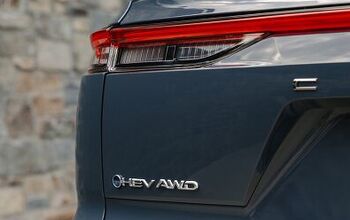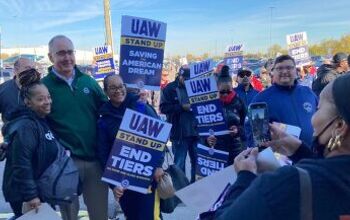Trade War Watch: Were the Auto Tariffs Ever Supposed to Be More Than a Threat?

The U.S. Commerce Department has submitted draft recommendations to the White House on its investigation into whether it’s prudent to impose tariffs of up to 25 percent on imported automobiles and parts, based on the premise that they’re a threat to national security. The possibility has the industry in a tizzy, with both foreign and domestic brands lobbying against it.
Truth be told, we half assumed the entire concept was a ruse to bring other nations to the bargaining table with something to lose — a scenario where the United States could be viewed as a favorable alternative to tariff-crazy China. However, China has begun opening its market to foreign automakers while also placing a massive 40 percent duty on American autos, leaving the U.S. at a disadvantage. Now it looks as if the Trump administration may go through with everything.
According to Reuters, two administration officials claim the Section 232 recommendations on ensuring health within the domestic auto industry are undergoing an interagency review process. They’ll be discussed today during the president’s weekly meeting with top trade officials. Thus far, the White House has promised not to move forward with new tariffs on the European Union or Japan as long as it is making constructive progress in trade negotiations.
The EU’s trade commissioner, Cecilia Malmstrom, is scheduled to convene with U.S. Trade Representative Robert Lighthizer in Washington on Wednesday to discuss the negotiations. However, one of the officials claims the Trump administration wanted to send a message for negotiators to get the lead out and make some real headway.
From Reuters:
But having the Commerce report ready for action would underscore a consistent threat from President Donald Trump – that he would impose tariffs on autos and auto parts unless the EU and Japan make trade concessions including lowering the EU’s 10 percent tariff on imported vehicles and cutting non-tariff barriers.
Trump has repeatedly suggested he would move quickly to impose tariffs, even before the Commerce Department launched its investigation in May into whether imported autos and parts pose a national security risk. The study followed closely on the heels of the imposition of similar national security tariffs on steel and aluminum.
“We said if we don’t negotiate something fair, then we have tremendous retribution, which we don’t want to use, but we have tremendous powers,” Trump said on Wednesday. “We have to – including cars. Cars is the big one. And you know what we’re talking about with respect to cars and tariffs on cars.”
In October, the administration said it had planned to open formal trade talks with the European Union and Japan in early 2019 — once the 90-day required congressional notification period ends. But backlash to the proposal cropped up long before that date.
Automakers, unilaterally opposed to higher tariffs, claim there’s no reason to presume imported vehicles and parts risk national security. Of course, security is unlikely a pressing matter within the industry. Already suffering in China due to its steep tariffs, certain brands don’t want additional import trouble.
A group representing major automakers told the Commerce Department in July that imposing tariffs of 25 percent on imported cars and parts would raise cumulative prices for U.S. vehicles by $83 billion annually and risk hundreds of thousands of jobs. According to the The Alliance of Automobile Manufacturers, consumers would see an alleged premium of $6,000 on imported vehicles and roughly $2,000 on domestically assembled products. Some automakers have threatened to scrap future investment in the U.S. if the administration goes through with the fees.
[Image: Nissan]

A staunch consumer advocate tracking industry trends and regulation. Before joining TTAC, Matt spent a decade working for marketing and research firms based in NYC. Clients included several of the world’s largest automakers, global tire brands, and aftermarket part suppliers. Dissatisfied with the corporate world and resentful of having to wear suits everyday, he pivoted to writing about cars. Since then, that man has become an ardent supporter of the right-to-repair movement, been interviewed on the auto industry by national radio broadcasts, driven more rental cars than anyone ever should, participated in amateur rallying events, and received the requisite minimum training as sanctioned by the SCCA. Handy with a wrench, Matt grew up surrounded by Detroit auto workers and managed to get a pizza delivery job before he was legally eligible. He later found himself driving box trucks through Manhattan, guaranteeing future sympathy for actual truckers. He continues to conduct research pertaining to the automotive sector as an independent contractor and has since moved back to his native Michigan, closer to where the cars are born. A contrarian, Matt claims to prefer understeer — stating that front and all-wheel drive vehicles cater best to his driving style.
More by Matt Posky
Latest Car Reviews
Read moreLatest Product Reviews
Read moreRecent Comments
- Peter Buying an EV from Toyota is like buying a Bible from Donald Trump. Don’t be surprised if some very important parts are left out.
- Sheila I have a 2016 Kia Sorento that just threw a rod out of the engine case. Filed a claim for new engine and was denied…..due to a loop hole that was included in the Class Action Engine Settlement so Hyundai and Kia would be able to deny a large percentage of cars with prematurely failed engines. It’s called the KSDS Improvement Campaign. Ever hear of such a thing? It’s not even a Recall, although they know these engines are very dangerous. As unknowing consumers load themselves and kids in them everyday. Are their any new Class Action Lawsuits that anyone knows of?
- Alan Well, it will take 30 years to fix Nissan up after the Renault Alliance reduced Nissan to a paltry mess.I think Nissan will eventually improve.
- Alan This will be overpriced for what it offers.I think the "Western" auto manufacturers rip off the consumer with the Thai and Chinese made vehicles.A Chinese made Model 3 in Australia is over $70k AUD(for 1995 $45k USD) which is far more expensive than a similar Chinesium EV of equal or better quality and loaded with goodies.Chinese pickups are $20k to $30k cheaper than Thai built pickups from Ford and the Japanese brands. Who's ripping who off?
- Alan Years ago Jack Baruth held a "competition" for a piece from the B&B on the oddest pickup story (or something like that). I think 5 people were awarded the prizes.I never received mine, something about being in Australia. If TTAC is global how do you offer prizes to those overseas or are we omitted on the sly from competing?In the end I lost significant respect for Baruth.


































Comments
Join the conversation
Chicken tax derp, derp. America sucks and Trump sucks derp, derp. Aussie land lost its auto industry and has a crap GDP. Chicken tax good. Trump good.
it amuses me on this site, how a click bait articles can stir up a frenzy ,all good for the pocketbooks of TTAC but most of us reasonable folks can read between the lines and realize that this is just posturing from Washington.USMCA is a great example. If a couple of USDMs decide to import a few less window switches and light bulbs from China, all the better.